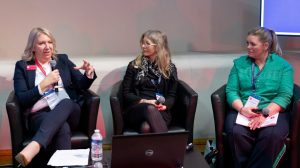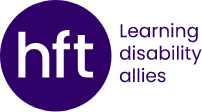2023-04-04 15:41:42
Hft brings learning disability and autism awareness to TSA conference for first time
Last week, learning disability charity Hft attended the Technology Enabled Care Services Association (TSA) conference ITEC which saw learning disabilities and autism included on the agenda for the first time.
The two-day conference, held at the ICC in Birmingham, was an opportunity for tech suppliers and customers, and TSA members to learn about technology enabled care and see some of the new exciting innovations on the market.

Emma Nichols, Personalised Technology Manager at Hft, was invited to speak on day two of the event at the ‘embedding enabling solutions across learning disability and autism’ workshop. The aim of this particular talk was to raise awareness and discuss some of the challenges facing learning disabled and autistic people when implementing technology.
Emma says, “This is the first time learning disabilities and autism have been included on the TSA agenda which is really exciting. It was great to have the opportunity to be a part of it and start to have the conversation about the barriers to implementing tech within the sector, as well as sharing stories and best practice.”
Karen McCormick, Founder and CEO of inCharge, also spoke at the event, highlighting a day in the life of her young adult daughter. Through the lived experiences of Karen and her non-verbal daughter, she believes that user-friendly, integrated and trustworthy technology can maximise wellbeing outcomes for the individual receiving support.
Charlotte Downing, Membership Engagement Manager at TSA, adds, “TSA are clear that there are significant opportunities to better support people with learning disabilities and autism across employment, education and everyday life, and to support those providing an informal care role.
“Thanks to the contributions and insights from Hft and others at ITEC 2023, TSA are determined to build on this session and to ensure that learning disabilities and autism are an element of all future events, and part of our work programme to share best practise.”
Emma identified a number of key challenges during the session that surrounded the over-arching barrier that learning disabled people are not considered enough. She discussed the existing lack of knowledge and awareness of technology and the benefits technology can offer health and social care providers.
Emma adds, “One of the key topics discussed was the need for commissioning models to change by embracing the use of technology as a key part of someone’s care and support and recognising the positive outcomes it can help achieve, both in terms of quality of life and efficiencies.
“There are so many options out there but people are just not accessing it. This is, one, because they aren’t aware of the options and/or don’t know how to go about implementing it. And, two, because there are no clear funding routes.
“We need to empower families and social care providers to play a key part in influencing change and this starts with how care is commissioned. We need to be looking at a more outcomes focused model, rather than just focusing on hours.”
Hft uses technology to tailor support to an individual’s needs. The charity, that promotes a person-centred support approach, aims to give learning disabled adults greater control over their lives and uses technology to support in achieving this.
Hft’s CEO, Kirsty Matthews, recently responded to the social care minister, Helen Whately, who said that devices such as Amazon’s Alexa are “just the tip of the iceberg” when it comes to the adoption of technology within the social care sector.
Ms Matthews commented, “Technology and AI can make a huge difference to adults with a learning disability, building independence and helping providers make the best use of a stretched workforce. By using it in a person-centred way, technology can truly shape the care and support needed by an individual to promote their independence and enable them to live the best life possible.”
The charity is now offering consultancy services that include person centred, holistic assessments as well as a number of training courses from bespoke workshops to accredited qualifications, all using practical examples and real-life case studies to raise awareness and better education around the implementation of personalised technology. You can find out more about the consultancy services on their website.
Notes to editors
For further information please phone 07500 224654 or email media.enquiries@hft.org.uk
About Hft
Proudly established in 1962 by a group of visionary parents, Hft is a charity supporting more than 2,500 learning disabled adults in England and Wales. Together, we are creating a future where learning disabled people and their families can live the best life possible.
Providing personalised support. Creating solutions for living independently. Coming together to campaign for positive change. Fundraising for new opportunities and a bigger impact.
In 2033, we’ll live in a world where learning disabled people have greater choice. About where they live. The support they need and want. And how to spend their time and money.
Learning disability versus difficulty
A learning disability is different from a learning difficulty but the terms are often confused and used inter-changeably. A learning difficulty does not affect general intellect, whereas a learning disability is a life-long condition characterised by a reduced intellectual ability and struggle with everyday activities.
–
For more information about Hft please visit www.hft.org.uk





